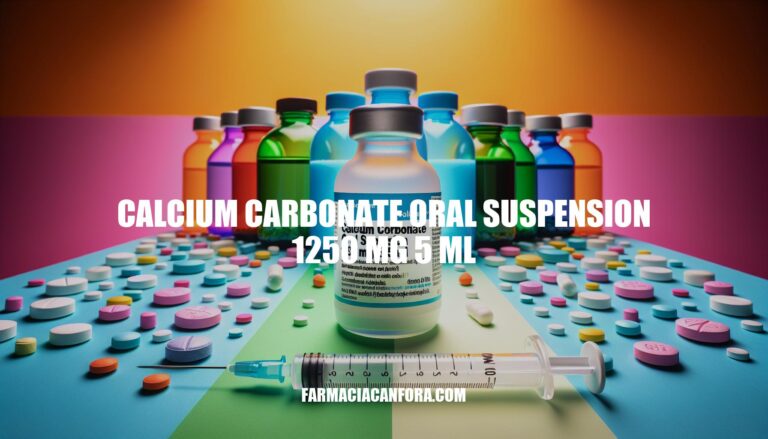


Calcium carbonate oral suspension 1250 mg/5 ml is primarily used as an antacid to relieve symptoms of heartburn, acid indigestion, and sour stomach. It also helps prevent and treat calcium deficiencies, which are crucial for maintaining healthy bones and teeth. This medication is important in medical treatments for conditions like osteoporosis and hypocalcemia.
Active Ingredient:
Inactive Ingredients:
Calcium carbonate oral suspension 1250 mg/5 ml works primarily as an antacid. When ingested, it neutralizes stomach acid by reacting with hydrochloric acid in the stomach to form calcium chloride, water, and carbon dioxide. This helps relieve symptoms of heartburn, acid indigestion, and upset stomach. Additionally, it provides a source of calcium, which is essential for maintaining healthy bones and normal functioning of nerves, muscles, and cells.
Here are the medical conditions and symptoms that calcium carbonate oral suspension 1250 mg/5 ml is commonly used to treat:
Here are the detailed instructions for the proper dosage and administration of calcium carbonate oral suspension 1250 mg/5 mL:
If you have any specific health conditions or concerns, it’s best to consult with your healthcare provider for personalized advice.
Potential Side Effects:
Necessary Precautions:
Storage Conditions:
Handling Procedures:
Calcium carbonate oral suspension 1250 mg/5 ml is used as an antacid to relieve heartburn, acid indigestion, and sour stomach symptoms. It also helps prevent and treat calcium deficiencies, crucial for healthy bones and teeth.
This medication is essential in treating conditions like osteoporosis and hypocalcemia. The active ingredient is calcium carbonate 1250 mg per 5 mL, equivalent to 500 mg elemental calcium.
Inactive ingredients include methylparaben, propylene glycol, and other excipients. Calcium carbonate works by neutralizing stomach acid, providing a source of calcium for healthy bones and normal nerve function.
It treats heartburn, indigestion, acid reflux, low calcium levels, bone loss, weak bones, parathyroid gland disorders, and muscle diseases.
The recommended dosage is 1-2 teaspoonfuls (5-10 mL) as symptoms occur or as directed by a doctor, with a maximum of 6 teaspoonfuls (30 mL) in 24 hours. It should be taken with meals to enhance absorption and stored at room temperature.
Potential side effects include constipation, upset stomach, gas, and altered taste. Serious reactions include nausea, vomiting, loss of appetite, and high levels of calcium in the blood. Precautions include informing a doctor about kidney disease, cancer, parathyroid gland disorders, or high calcium levels.